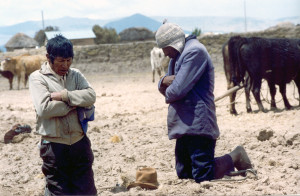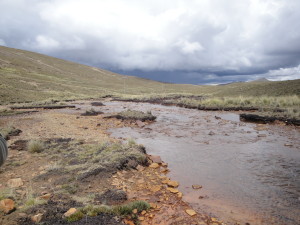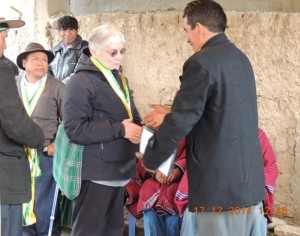
In the high, hardscrabble plains of Peru’s Altiplano, the Aymara people are struggling to make a living. Despite poor soil and a harsh climate, they have persevered, growing potatoes, quinoa, corn, beans, barley wheat and a number of other vegetables native to the region, and raising llamas and sheep on the coarse grass and the waters of the Condoraque River.
Their lives became endangered some years ago, however, when it was found that a mining company located along the river was contaminating the waters and thereby causing many of the poor Aymaras’ livestock to die. Their whole way of living was being severely threatened.
One of the people who wasn’t about to let the Aymaras suffer was Maryknoll Sister Pat Ryan. Since 1971, Sister Pat Ryan has been serving the poor of Peru, and defending the rights of the indigenous people whom she loves so dearly.

Sister Pat is president of Human Rights and Environment of Puno, Peru, an organization which, in just the past three years alone, has helped equip indigenous people with understanding and skills to defend their human rights, successfully spoken out for those rights and seen mining companies back away from plans that would have continued to damage the lands and water so vital to the Aymaras’ livelihood, and legally represented these poor people against large corporations, resulting in decisions that will require the mines to remediate the environmental damages that have already been caused in the region, create programs to benefit the indigenous peoples of the area, as well as allow them to benefit financially from the proceeds such corporations may obtain through use of the land.
None of this would have been possible, Sister Pat says, without the generosity of the people who support her and Maryknoll Sisters, enabling them to fund the costs that are helping the poor of the Altiplano learn about their rights, as well as how to defend them in a non-violent manner, preserve their livelihood, and work with them toward public recognition of the Aymara people by the Peruvian as a distinct ethnic group with specific rights that must be protected.

This past December 17, 2014, Sister Pat and the Human Rights and Environment Office of Puno, the organization she currently serves as president, were among those honored for their efforts and achievements on behalf of the indigenous people of the Altiplano by Mayor Marino Catacora Ticona of the Quilcapunco District of Peru, just north of Lake Titicaca.
Sister Pat and her team are grateful for the progress they have made so far, but they know that securing human rights firmly for the indigenous people of the Altiplano are far from over. Legal cases brought against indigenous people, sometimes simply for exercising their rights to peaceful assembly, continue, as does the work the Human Rights and Environment Offices does in providing free information, orientation and consultation services to the general public, especially Aymara and Quechua peoples with limited financial resources. Training programs for indigenous peoples must continue, as must workshops for people in decentralized areas, and seminars with judges, public prosecutors and lawyers to familiarize them with basic documents related to the rights of indigenous people.
Our thanks go to all our supporters who are helping Sister Pat and her team train the people of the Altiplano to know and speak out for their own rights, and to bring awareness and change to the Peruvian government, so that all people, in particular the indigenous poor, might live with dignity and the earth, from which we each derive our livelihoods, might be restored and protected.
